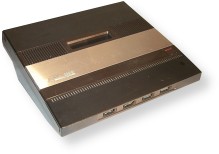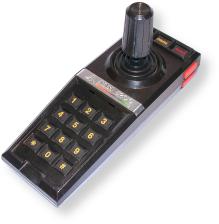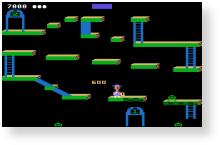|
|
|
 |
|
Atari 5200 SuperSystem
(original 4-port version)
|
In 1982, Atari introduced the Atari 5200 to the gaming
public. The originally planned sequel to the 5200 was a system called
the 3200, but development was halted on it as being too difficult to develop
for. Atari decided to produce a game system based on its line of 8-bit
computers, which also happened to be fairly decent at playing games. Games
could be ported very easily from the Atari 400/800 to the Atari 5200,
and many were (especially in later years). The biggest hardware difference
between the 5200 and 8-bit computers was the inclusion of an analog joystick
with the 5200. This controller allowed a full 360 degrees of movement,
but unfortunately it was not self-centering. This made it very difficult
to play many games, such as Pac-Man.
In addition, the controllers were prone to failure, making it very difficult
these days to find a 5200 system with working controllers. Several third-party
vendors (most notably Wico) did release better controllers and devices
that allowed use of 9-pin 2600 compatible joysticks.
 |
|
The Infamous 5200 Controller
|
In addition to the analog control stick, 5200 controllers
also sported a keypad which allowed for overlays
in the same fashion as Intellivision controllers. Unlike the Intellivision,
most games on the 5200 didn't come with overlays. The 5200 controllers
also sported a pause button, one of the first consoles to have this feature.
The original 5200 was released with four joystick ports, not unlike the
Atari 800 computer. The original 5200 also came with a unique RF switchbox
that supplied power to the 5200 on the same cable that provided the video/audio
signal to the television. While this was probably an attempt to reduce
the number of cables running across the floor, if this adapter happens
to break you can't just run down to Radio Shack to buy a new one. The
second generation 5200 system reduced the number of ports to two and came
with a normal power supply and RF switchbox (something to keep in mind
if you're looking to add a 5200 system to your collection!)
 |
|
|
The 5200 probably has a higher percentage of quality
games for it than any other system at the time (or even the present!)
Unfortunately, the 5200 also had a short life due to the infamous game
crash of 1984. There are quite a few excellent prototype titles that were
probably very close to being released, but never made it to market. Today
you can play these games through emulation
and even on a 5200 console thanks to Sean
Kelley's Multicart. The 5200 is a great system to collect for, not
only because there are many excellent games for it, but also because it's
one of the systems where all the released games can be obtained. And there
also seem to be many prototype carts floating around, probably due to
the large number of titles under development when the market crashed.
|

